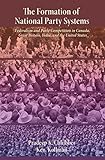The Formation of National Party Systems : Federalism and Party Competition in Canada, Great Britain, India, and the United States / Ken Kollman, Pradeep Chhibber.
Material type: TextPublisher: Princeton, NJ : Princeton University Press, [2009]Copyright date: ©2004Edition: Course BookDescription: 1 online resource (272 p.)Content type:
TextPublisher: Princeton, NJ : Princeton University Press, [2009]Copyright date: ©2004Edition: Course BookDescription: 1 online resource (272 p.)Content type: - 9780691119328
- 9781400826377
- online - DeGruyter
- Issued also in print.
| Item type | Current library | Call number | URL | Status | Notes | Barcode | |
|---|---|---|---|---|---|---|---|
 eBook
eBook
|
Biblioteca "Angelicum" Pont. Univ. S.Tommaso d'Aquino Nuvola online | online - DeGruyter (Browse shelf(Opens below)) | Online access | Not for loan (Accesso limitato) | Accesso per gli utenti autorizzati / Access for authorized users | (dgr)9781400826377 |
Frontmatter -- Contents -- List of Figures and Tables -- Acknowledgments -- Chapter 1. Introduction -- Chapter 2. Electoral Competition at the Constituency Level -- Chapter 3. Party Aggregation -- Chapter 4. From Local Notables to Party Competition -- Chapter 5. Centralization and Provincialization -- Chapter 6. Dynamics of Party Aggregation -- Chapter 7. Party Aggregation in Four Countries -- Chapter 8. Conclusion -- Appendix -- Bibliography -- Index
restricted access online access with authorization star
http://purl.org/coar/access_right/c_16ec
Pradeep Chhibber and Ken Kollman rely on historical data spanning back to the eighteenth century from Canada, Great Britain, India, and the United States to revise our understanding of why a country's party system consists of national or regional parties. They demonstrate that the party systems in these four countries have been shaped by the authority granted to different levels of government. Departing from the conventional focus on social divisions or electoral rules in determining whether a party system will consist of national or regional parties, they argue instead that national party systems emerge when economic and political power resides with the national government. Regional parties thrive when authority in a nation-state rests with provincial or state governments. The success of political parties therefore depends on which level of government voters credit for policy outcomes. National political parties win votes during periods when political and economic authority rests with the national government, and lose votes to regional and provincial parties when political or economic authority gravitates to lower levels of government. This is the first book to establish a link between federalism and the formation of national or regional party systems in a comparative context. It places contemporary party politics in the four examined countries in historical and comparative perspectives, and provides a compelling account of long-term changes in these countries. For example, the authors discover a surprising level of voting for minor parties in the United States before the 1930s. This calls into question the widespread notion that the United States has always had a two-party system. In fact, only recently has the two-party system become predominant.
Issued also in print.
Mode of access: Internet via World Wide Web.
In English.
Description based on online resource; title from PDF title page (publisher's Web site, viewed 30. Aug 2021)


